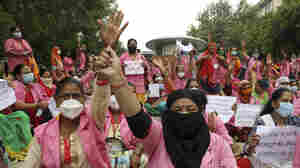Radhika (15), Anjali (16), Suman (21), and Suhani (15) in July 2022 perform a dance routine near the village of Sahana Pahari, Jharia. Walaa Alshaer for NPR hide caption
Goats and Soda
STORIES OF LIFE IN A CHANGING WORLDHealth
Joyce Cohen Lashof was the first female dean of UC Berkeley's School of Public Health and a lifelong fighter for social justice. UC Berkeley School of Public Health hide caption
In some hospitals, like this one in Chongqing, one of China's largest cities, patients are lying on gurneys in the lobby because beds have run out. Noel CELIS/AFP via Getty Images hide caption
Fears of a 'dark COVID winter' in rural China grow as the holiday rush begins
Servers at the All India Institute of Medical Sciences in New Delhi are still not back to normal two weeks after they were hacked and the data was held for ransom. Amal KS/Hindustan Times via Getty Images hide caption
Do some people have built-in protection against a COVID infection? Laura Gao for NPR hide caption
Alexis Mukwedi tested positive for sleeping sickness during a two-day mobile screening in the Democratic Republic of the Congo. He had complained about nervous tics and fatigue. Xavier Vaheed-DNDi hide caption
Workers wear protective gear in a Beijing neighborhood placed under lockdown in November. China had raised hopes by slightly relaxing its zero-COVID policy, but cities have been contending with a surge in cases. Bloomberg via Getty Images hide caption
After witnessing the social media debate about whether to sell sanitary pads on trains, university student Wendy Kou made posters about fighting "period shame" and hung them around her campus. Wendy Kou hide caption
Zania Muhammed comforts her malnourished son, Mazzam Brahim, in the emergency section for critical care patients at a hospital in N'djamena, Chad. The war in Ukraine has caused food prices to skyrocket, leaving many without enough to eat. Andrew Caballero-Reynolds/AFP via Getty Images hide caption
Even remote corners of Africa are feeling the costly impacts of war in Ukraine
A medical worker gestures to an Ebola patient inside an isolation center in the village of Madudu, Uganda. The country is taking several public health measures to try to stem the outbreak. Hajarah Nalwadda/AP hide caption
Darine Al-Ahmar (left), who directs a primary care health center in Douris, Lebanon, and Josette Najjar, with the Lebanese branch of the Mérieux Foundation, have seen the number of cholera cases rise around their region. Ari Daniel/NPR hide caption
Amid vaccine shortages, Lebanon faces its first cholera outbreak in three decades
A forest cobra is harvested for its venom at the Research Institute of Applied Biology of Guinea. Its venom will be analyzed for various toxins and help inform future antidote development. Guy Peterson for NPR hide caption
The Anopheles stephensi mosquito, seen here sitting on a window, is year-round pest that has invaded urban areas in parts of Africa, and has recently been the cause of dramatic outbreaks of malaria in Ethiopia. Soumyabrata Roy/NurPhoto via Getty Images hide caption
This urban mosquito threatens to derail the fight against malaria in Africa
An injured Tigray People's Liberation Front fighter who was shot in the cheek recovers after surgery at the Ayder Comprehensive Specialized Hospital in Mekele, the capital of Ethiopia's Tigray region. It's the only place in Tigray currently conducting surgery. Elsewhere, "they are stopped because there is no supply, there is no electricity, and there is no fuel," says one Tigray doctor. Yasuyoshi Chiba/AFP via Getty Images hide caption
'Where is humanity?' ask the helpless doctors of Ethiopia's embattled Tigray region
Babies around the world evoke a special kind of language from grown-ups. Above: Photographer Sarah Waiswa, born in Uganda and now living in Kenya, made this photo of her daughter, Ria. Sarah Waiswa/@EverydayAfrica hide caption
Scholars confirm what itsy bitsy babies around the world already know
A pharmacist on the Phelophepa health-care train takes payment for a patient's prescription. Tommy Trenchard for NPR hide caption
Female community health care workers protest in New Delhi, India, in August 2020. The women are part of a government program called Accredited Social Health Activists — and are demanding higher pay and better working conditions. In May, the program won an award from the World Health Organization. T. Narayan/Bloomberg via Getty Images hide caption
Staff volunteers queue to receive a fourth dose of the Pfizer COVID-19 vaccine at Sheba Medical Center in Israel on Dec. 27, 2021, as the hospital conducted a trial of a fourth jab of the vaccine. Jack Guez/AFP via Getty Images hide caption
SARS-CoV-2, the coronavirus that causes the disease COVID-19, is a big viral family with many variants. Just like with a human family tree, the distance between two variants shows roughly how related they are. This illustration is inspired by the SARS-CoV-2 phylogenetic tree generated by Emma Hodcroft of Nextstrain.org and the University of Bern. Her tree is reproduced within the story below. Kat Hubbs for NPR hide caption
Fever is a possible side effect of a COVID19 vaccine. Catie Dull/NPR hide caption
International visitors who fly into the U.S. will have a new set of rules and requirements regarding COVID-19 vaccines, starting Nov. 8. Angus Mordant/Bloomberg via Getty Images hide caption
Dr. KJ Seung, a professor at Harvard Medical School, speaks at a September rally outside the home of the CEO of Moderna, maker of one of the two mRNA vaccines that prevent COVID-19. The fake bones are meant to represent lives lost unnecessarily to the coronavirus. Seung was part of a group of doctors demanding Moderna share vaccines — and its recipe — with low-resource countries. Jasper G. Goodman/The Harvard Crimson hide caption
Rochelle dos Santos helps her daughter with physical therapy. Many children with congenital Zika disorder are physically disabled. Ueslie Marcilino/Undark Magazine hide caption
























